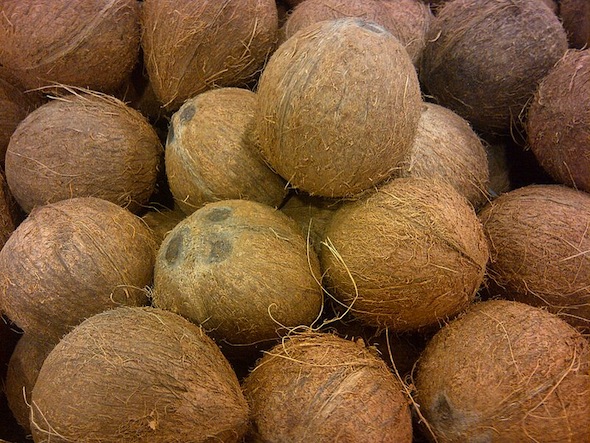If you have been reading this blog for a while you know that I use coconut products in a lot of my recipes. I love coconut, but it didn’t start out that way. When I first learned that coconut oil was in fact a good fat, I really did not care for the taste of coconut at all. I had to force myself to use it. How did I change my taste buds and why would I want to?
I will admit something that embarrasses me — I was a lover of margarine. Years ago, when the diet dictocrats (really the food oil industry) proclaimed that butter was bad and margarine was good, I fell for it hook, line and sinker. I never used butter again, but I loved margarine.
When I think of all my cell membranes made of rancid processed oils, I shudder and I hope that my change in diet happened before too much damage was done. That knowledge has motivated me to give certain foods a chance to grow on me — coconut being one of them.
How did coconut oil get such a bad rep?
The answer comes down to simple economics and politics. Based on some flawed studies performed over four decades ago, some of which used primarily unhealthy hydrogenated coconut oils, a powerful anti-saturated fat movement began.
Hydrogenated oils are oils with trans-fatty acids, which have been altered from their original chemical composition and have been shown to raise cholesterol levels and lead to heart disease and other health problems. You should not consume hydrogenated oils, whether it is coconut or any other vegetable oil.
Trans fats and hydrogenated oils are actually being banned from certain municipalities because people are starting to understand what Dr. Mary Enig has been saying for the past four decades.
Edible oil industry gained power
Around the 1960’s the edible oil industry began to denounce all saturated fats and heavily promote polyunsaturated fats such as canola, soybean, safflower, corn, and other seed and nut oils.
However, these oils are highly refined, easily become rancid when exposed to oxygen and produce large amounts of damaging free radicals in the body. What is not commonly known is that these oils can actually cause premature aging, clotting, inflammation, cancer and weight gain.
Coconut oil makes a comeback
Fortunately, coconut oil has begun to gain some positive media exposure as researchers realize its health-promoting qualities. However, coconut oil can vary widely in terms of the types of coconuts used and the manufacturing processes used to make the oil. These factors play a major role in the effectiveness of the oil.
Be careful what type of coconut oil you buy
Many commercial coconut oils are RBD (refined, bleached, and deodorized). RBD oils do contain the healthy medium chain fatty acids and they also contain chemicals used in processing. Buy a coconut oil that has not been bleached, deodorized, refined or hydrogenated. This is called virgin coconut oil. Similarly, if you purchase coconut, buy the unsweetened and unrefined type.
There are several ways to classify coconut oil.
Virgin coconut oil and extra virgin coconut oil
These two oils are both unrefined and usually made from fresh coconut. Heat may be used before or after the oil is expressed, in order to remove any water. This will ensure a longer shelf life. There are only a few virgin coconut oils that are truly raw. Why do you want it raw? Because that does preserve the flavor as well as all the nutrients in it. All virgin coconut oils should have a coconut taste, though this can vary from strong to very mild.
Expeller pressed and centrifuged coconut oils
These oils usually have some heat used in the processing and cleaning of the oil. The color can vary from a tan color to an off white color depending on how clean it is. The oil may taste “off” and it can burn the tongue if it is not cleaned well. I use expeller pressed and centrifuged oils that are both very clean and delicate and do not have a sharp taste.
Refined coconut oils
Refined oils have no taste, because they have been more processed than the expeller pressed oils. You must be very careful in buying refined oils as these tend to be highly processed, deodorized and may even be hydrogenated! Do not buy refined coconut oil in the conventional market.
Coconut oil has numerous health supporting properties
Coconut oil is rich in lauric acid, which is known for being antiviral, antibacterial and antifungal. Lauric and palmitic fatty acids are found in mother’s breast milk and help protect the infant against pathogens. Studies have shown the antimicrobial benefits of coconut oil.
Investigations on the effects of the medium chain triglycerides in coconut oil, on neurological diseases such Alzheimer’s, show benefits. Other research shows coconut oil to benefit epilepsy.
Isn’t coconut oil awesome? How do you use coconut oil? Leave a comment and let me know!











